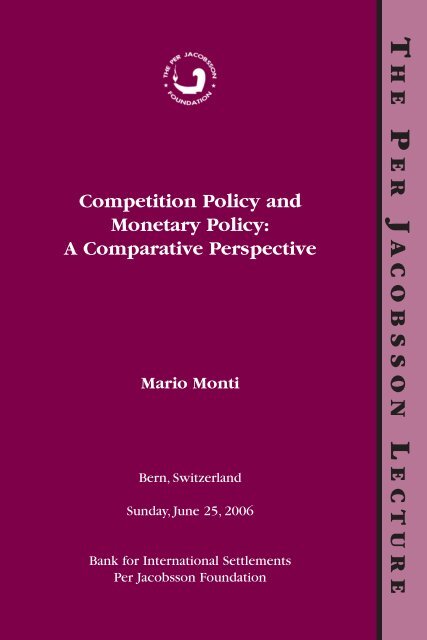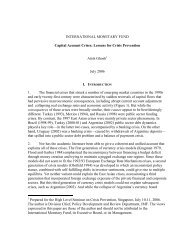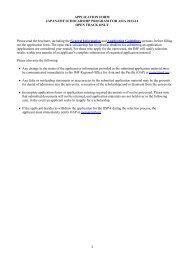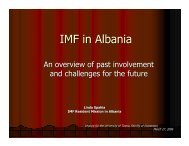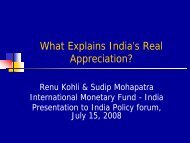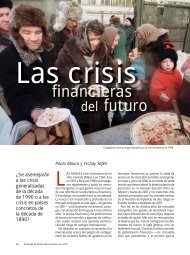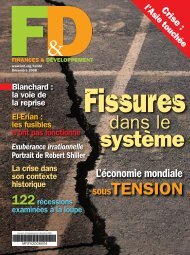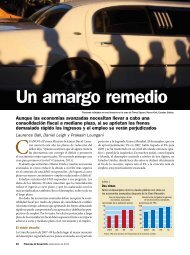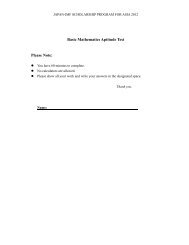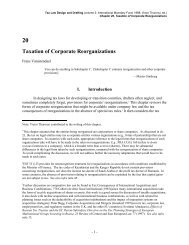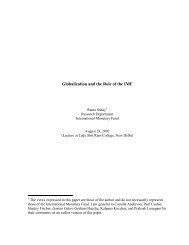Competition Policy and Monetary Policy - Per Jacobsson Foundation
Competition Policy and Monetary Policy - Per Jacobsson Foundation
Competition Policy and Monetary Policy - Per Jacobsson Foundation
Create successful ePaper yourself
Turn your PDF publications into a flip-book with our unique Google optimized e-Paper software.
<strong>Competition</strong> <strong>Policy</strong> <strong>and</strong><br />
<strong>Monetary</strong> <strong>Policy</strong>:<br />
A Comparative <strong>Per</strong>spective<br />
Mario Monti<br />
Bern, Switzerl<strong>and</strong><br />
Sunday, June 25, 2006<br />
Bank for International Settlements<br />
<strong>Per</strong> <strong>Jacobsson</strong> <strong>Foundation</strong><br />
T h e P e r J a c o b s s o n L e c t u r e
<strong>Competition</strong> <strong>Policy</strong> <strong>and</strong><br />
<strong>Monetary</strong> <strong>Policy</strong>:<br />
A Comparative <strong>Per</strong>spective<br />
Mario Monti<br />
Bank for International Settlements<br />
<strong>Per</strong> <strong>Jacobsson</strong> <strong>Foundation</strong><br />
2006
ISSN 0252-3108<br />
Editor: Esha Ray<br />
Composition: Alicia Etchebarne-Bourdin<br />
Cover design <strong>and</strong> production: IMF Multimedia Services Division<br />
The <strong>Per</strong> <strong>Jacobsson</strong> lectures are available on the Internet at<br />
www.perjacobsson.org, which also contains further information<br />
on the <strong>Foundation</strong>. Copies of the <strong>Per</strong> <strong>Jacobsson</strong> lectures may be<br />
acquired without charge from the Secretary.
Contents<br />
Page<br />
Foreword . . . . . . . . . . . . . . . . . . . . . . . . . . . . . . . . . . . . . . v<br />
Opening Remarks<br />
Malcolm D. Knight. . . . . . . . . . . . . . . . . . . . . . . . . . . . . . 1<br />
Andrew D. Crockett . . . . . . . . . . . . . . . . . . . . . . . . . . . . . 2<br />
<strong>Competition</strong> <strong>Policy</strong> <strong>and</strong> <strong>Monetary</strong> <strong>Policy</strong>:<br />
A Comparative <strong>Per</strong>spective<br />
Mario Monti . . . . . . . . . . . . . . . . . . . . . . . . . . . . . . . . . . . 3<br />
Questions <strong>and</strong> Answers . . . . . . . . . . . . . . . . . . . . . . . . . . . 14<br />
Biography . . . . . . . . . . . . . . . . . . . . . . . . . . . . . . . . . . . . . 21<br />
The <strong>Per</strong> <strong>Jacobsson</strong> Lectures. . . . . . . . . . . . . . . . . . . . . . . . . 22<br />
The <strong>Per</strong> <strong>Jacobsson</strong> <strong>Foundation</strong> . . . . . . . . . . . . . . . . . . . . . . 25<br />
iii
Foreword<br />
The first 2006 <strong>Per</strong> <strong>Jacobsson</strong> lecture, “<strong>Competition</strong> <strong>Policy</strong> <strong>and</strong><br />
<strong>Monetary</strong> <strong>Policy</strong>: A Comparative <strong>Per</strong>spective” was delivered by<br />
Mario Monti, President of Bocconi University, Milan, on Sunday,<br />
June 25, 2006. Mr. Monti’s presentation was made in the Nationalratssaal<br />
of the Swiss Parliament in Bern, Switzerl<strong>and</strong>, in conjunction<br />
with the Annual General Meeting of the Bank for International<br />
Settlements (BIS) in Basel. Andrew D. Crockett, Chairman of the<br />
<strong>Per</strong> <strong>Jacobsson</strong> <strong>Foundation</strong>, <strong>and</strong> Malcolm D. Knight, General Manager<br />
of the BIS, presided over the event, the proceedings of which<br />
are presented in this publication.<br />
The <strong>Per</strong> <strong>Jacobsson</strong> <strong>Foundation</strong> was established in 1964 to commemorate<br />
the work of <strong>Per</strong> <strong>Jacobsson</strong> (1894–1963) as a statesman<br />
in international monetary affairs. <strong>Per</strong> <strong>Jacobsson</strong> was the third<br />
Managing Director of the IMF (1956–63) <strong>and</strong> had earlier served as<br />
the Economic Adviser of the BIS (1931–56).
Opening Remarks<br />
Malcolm Knight<br />
Ladies <strong>and</strong> gentlemen, let me welcome all of you to a key<br />
event of this weekend, the <strong>Per</strong> <strong>Jacobsson</strong> <strong>Foundation</strong> Lecture to<br />
be delivered this morning by our distinguished speaker, Professor<br />
Mario Monti.<br />
It is a great honor that we have been permitted to hold this<br />
lecture <strong>and</strong> panel discussion here in the splendid setting of the<br />
National Council Chamber of the Swiss Parliament. Just to dispel<br />
any misunderst<strong>and</strong>ing: the temporary fences behind which we left<br />
our buses have not been placed there for reasons of security. They<br />
are there because this historic building will undergo a major renovation<br />
in the coming months, starting from tomorrow morning.<br />
The Swiss National Council is made up of 200 elected members,<br />
<strong>and</strong> it represents the voice of the Swiss people. It is therefore<br />
most appropriate that the room is dominated by the magnificent<br />
fresco behind me, depicting the Rütli meadow in the<br />
foreground, representing the cradle of the old Swiss confederacy<br />
<strong>and</strong> the roots of democracy in this country that extend back more<br />
than 700 years. In the picture, the Angel of Peace emerges from a<br />
cloud <strong>and</strong> hovers over the meadow. To your right of the picture<br />
is a statue of Wilhelm Tell, the legendary Swiss national hero of<br />
liberty. I don’t need to remind you of the story of his being forced<br />
to shoot an apple off his son’s head with a crossbow.<br />
The Rütli meadow is situated on the western shore of Lake Lucerne,<br />
where in 1291 the people of the three Swiss cantons Uri,<br />
Schwyz, <strong>and</strong> Unterwalden swore an oath—with an eye on their<br />
powerful Habsburg neighbors—to st<strong>and</strong> with each other against<br />
anyone trying to oppress them. <strong>Per</strong>haps there is an analogy here<br />
to the regular meetings of central bank governors in Basel. While
<strong>Per</strong> <strong>Jacobsson</strong> Lecture<br />
central bank governors have not yet been obliged to meet in an<br />
open meadow to swear their solidarity <strong>and</strong> independence from<br />
politicians, I hope that the regular discussions <strong>and</strong> exchanges in<br />
the Bank for International Settlements (BIS) Tower in Basel <strong>and</strong><br />
elsewhere help to reaffirm the shared goals, the cooperation, <strong>and</strong><br />
the independence of central banks in pursuing their monetary<br />
<strong>and</strong> financial stability policies. The mural behind me reminds<br />
us, perhaps, that similar ideals <strong>and</strong> goals to ours are shared with<br />
other domains.<br />
In the spirit of peace <strong>and</strong> cooperation in confronting the challenges<br />
facing the central bank community, it gives me great pleasure<br />
to welcome you to this event <strong>and</strong> also to welcome Mario<br />
Monti on behalf of the BIS.<br />
ANDREW CROCKETT<br />
Governors, ladies <strong>and</strong> gentlemen, good morning <strong>and</strong> welcome.<br />
It is my great pleasure, on behalf of the <strong>Per</strong> <strong>Jacobsson</strong> <strong>Foundation</strong>,<br />
to introduce <strong>and</strong> welcome our lecturer, Mario Monti. I have<br />
known Mario for a number of years, <strong>and</strong> he is well known to<br />
you, including through his contributions to monetary economics<br />
<strong>and</strong>, more recently, his work for 10 years as a European<br />
Commissioner, with responsibility, first, for the internal market,<br />
financial services <strong>and</strong> financial integration, customs, <strong>and</strong> taxation<br />
(1995–99) <strong>and</strong> later for competition (1999–2004). Before joining<br />
the Commission, he was Professor of Economics <strong>and</strong> Rector at<br />
Bocconi University, where he has been President since 1994. His<br />
background clearly makes him the ideal speaker on the subject<br />
of his lecture, which is <strong>Competition</strong> <strong>Policy</strong> <strong>and</strong> <strong>Monetary</strong> <strong>Policy</strong>.<br />
Without more ado, Mario, I will h<strong>and</strong> over to you.
<strong>Competition</strong> <strong>Policy</strong> <strong>and</strong><br />
<strong>Monetary</strong> <strong>Policy</strong>:<br />
A Comparative <strong>Per</strong>spective<br />
Mario Monti<br />
Ladies <strong>and</strong> gentlemen, Governors, I should first say, I am deeply<br />
grateful to the <strong>Per</strong> <strong>Jacobsson</strong> <strong>Foundation</strong> <strong>and</strong> to the BIS for providing<br />
me with this opportunity. I am honored to have been invited<br />
to deliver this <strong>Per</strong> <strong>Jacobsson</strong> <strong>Foundation</strong> Lecture, <strong>and</strong> by the<br />
presence of so many distinguished guests.<br />
It is, of course, a special privilege to take the floor in this Nationalrat<br />
at the heart of the Swiss Confederation, which has been<br />
working smoothly as a Confederation for the last 715 years,<br />
which is a bit longer than most of our own home countries.<br />
And I believe this Parliament is a symbol of democracy, <strong>and</strong><br />
this Confederation is also a symbol, as one would say today, of<br />
subsidiarity.<br />
We honor a man, <strong>Per</strong> <strong>Jacobsson</strong>, who was not only a statesman<br />
of the international economy as head of the <strong>Monetary</strong> <strong>and</strong><br />
Economic Department of the BIS, <strong>and</strong> subsequently as Managing<br />
Director of the IMF, but was also gifted with an outst<strong>and</strong>ing ability<br />
to communicate complex issues in a straightforward language<br />
<strong>and</strong> in a lively, persuasive style—a challenging benchmark indeed<br />
for those called to deliver lectures in his name, especially if such<br />
lectures take place early on a Sunday morning, <strong>and</strong> are delivered<br />
to a distinguished audience who in order to take part decided to<br />
indulge in a train excursion very, very early in the morning.<br />
Why have I selected for my remarks the rather unusual topic,<br />
“<strong>Competition</strong> <strong>Policy</strong> <strong>and</strong> <strong>Monetary</strong> <strong>Policy</strong>: A Comparative <strong>Per</strong>spective?”<br />
For two reasons. There is first an objective reason. <strong>Monetary</strong>
<strong>Per</strong> <strong>Jacobsson</strong> Lecture<br />
policy <strong>and</strong> competition policy are two key components of public<br />
policies needed for a market economy to function well, <strong>and</strong> indeed<br />
to exist, just as money <strong>and</strong> the market are two defining elements<br />
of such an economy.<br />
The other reason is subjective. In my own professional life, it<br />
so happens that I first devoted 25 years as an academic economist<br />
to money, as a student of monetary <strong>and</strong> financial economics,<br />
<strong>and</strong> then 10 years to the market, with policy responsibility<br />
for the development of a single market in the European Union<br />
(EU), <strong>and</strong> for the maintenance of competitive conditions in that<br />
market. So it occurred to me that in addressing distinguished<br />
personalities who have key responsibilities in the h<strong>and</strong>ling of<br />
national <strong>and</strong> international monetary affairs, I might reflect on<br />
these two policies, money <strong>and</strong> competition, in a comparative<br />
perspective.<br />
I should complete this premise by two brief observations. One,<br />
in my education as a monetary economist, I owe a lot to the<br />
country that is hosting us this morning. Although I was a student<br />
of James Tobin at Yale, I benefited from the strong influence of<br />
Karl Brunner of the University of Berne <strong>and</strong> also Rochester. Beginning<br />
in 1972, I attended for a number of years his Konstanz<br />
seminars on monetary theory <strong>and</strong> policy not far from here, <strong>and</strong><br />
I recognize faces who were key actors when I was a young <strong>and</strong><br />
naive economist on that mosquito-plagued lake at the end of<br />
June each year.<br />
Also, it was with a small group of economists chaired by Karl<br />
Brunner that I had the unusual experience in September 1980<br />
of having tea with Prime Minister Thatcher at No. 10 Downing<br />
Street <strong>and</strong> discussing what the Bank of Engl<strong>and</strong> might—she<br />
would have said should—have done differently at the time in<br />
order to keep some order in a rather messy monetary situation.<br />
Of course, the Governor at the time was not invited to that seminar,<br />
in the characteristic No. 10 style of those days.<br />
Apropos independence of central banks, the second <strong>and</strong> last<br />
observation of my premise is that when I was a monetary economist,<br />
I devoted my best efforts to asserting the intellectual case for<br />
the independence of central banks—particularly, of course, starting<br />
close to home since the early 1980s in the case of the Bank<br />
of Italy, which I must say at that time was not very keen itself<br />
to make the case for a form of independence, <strong>and</strong> then again in
Mario Monti<br />
<br />
1993 as a member of Eric Roll’s panel pleading the case for the<br />
independence of the Bank of Engl<strong>and</strong>. 1<br />
As you will soon recognize, I have since lost a lot of confidence<br />
in my knowledge of monetary policy, so it is with humility<br />
that I approach it, even though it is just one of the two key words<br />
in the headline of today’s presentation.<br />
My first reflection on monetary policy <strong>and</strong> competition policy<br />
compared is that they both serve in different ways the same<br />
objective, or at least they have one objective in common, even<br />
though their practitioners may not always realize it, <strong>and</strong> that is<br />
price stability. <strong>Monetary</strong> policy, of course, has the fight against<br />
inflation as its paramount objective. One might ask the question,<br />
as a recent BIS paper did, is price stability enough? What are<br />
the dimensions of stability to be cultivated by a central bank?<br />
Price stability may refer to output prices, or asset prices, <strong>and</strong><br />
so on, but certainly the objective of some price stability is at<br />
the core of monetary policy. Also, competition policy, although<br />
it is not primarily designed to achieve this, may indeed make<br />
an important contribution to price stability by helping to avoid<br />
price increases.<br />
I believe that monetary policies in most countries have been<br />
largely successful in recent periods in achieving their objectives,<br />
<strong>and</strong> I believe that in some parts of the world, maybe in Europe<br />
specifically, this has been facilitated by a number of positive supply<br />
shocks, including the setting in motion of conditions in the<br />
real economy of greater flexibility <strong>and</strong> also the creation of the<br />
single market, the tearing down of barriers, <strong>and</strong> the creation <strong>and</strong><br />
maintenance of competitive conditions. If we put together the<br />
creation of the single market, a number of liberalization initiatives,<br />
the enforcement of competition rules, plus, of course, the<br />
opening up to greater Chinese <strong>and</strong> other competition, this is a set<br />
of supply shocks that probably has helped the monetary authorities<br />
in their difficult task.<br />
In this context, one question also comes to my mind: what<br />
about the response to cycles of both policies? For monetary policy<br />
there was in the past the ambition of fine-tuning it in order to be<br />
precisely countercyclical, but at those Konstanz seminars the early<br />
1 Independent <strong>and</strong> Accountable: A New M<strong>and</strong>ate for the Bank of Engl<strong>and</strong> (London:<br />
Centre for Economic <strong>Policy</strong> Research, 1993).
<strong>Per</strong> <strong>Jacobsson</strong> Lecture<br />
experience of the Swiss National Bank, looked at very carefully by<br />
the Deutsche Bundesbank, suggested to many that maybe it was<br />
wiser to adopt a longer time horizon for monetary policy decisions.<br />
I believe that this is now established practice, in different<br />
ways <strong>and</strong> modalities, although one could hardly say that monetary<br />
policy has completely forgotten the objective, or at least side objective,<br />
of trying to moderate the business cycle.<br />
You may be aware that a similar discussion has been going on<br />
for a while with regard to competition policy. It comes up <strong>and</strong><br />
down like the Loch Ness monster, as Professor Tobin used to say<br />
about his own Tobin Tax. Because when conditions in the real<br />
economy become really tough, generally for specific industries,<br />
the voice is always there—that competition policy should for a<br />
while become more “reasonable,” that enforcement should become<br />
less tough.<br />
Take the case of the telecommunications industry in Europe, but<br />
not only in Europe, after the bursting of the bubble in the early<br />
years of this decade. I was then <strong>Competition</strong> Commissioner in<br />
Brussels, <strong>and</strong> there were huge pressures from the telecommunications<br />
industry to have a sort of a pause in the application of competition<br />
rules to that industry—otherwise the industry could suffer<br />
too much—<strong>and</strong> rather daring ideas were coming up to this effect.<br />
Normally, the view of the competition authorities is that it would<br />
not be a good idea to insert a cyclical element into the h<strong>and</strong>ling<br />
of competition policy, precisely because when an industry is in<br />
difficulty, if it is an industry characterized by high concentration<br />
<strong>and</strong> incumbents—maybe former monopolists—who still enjoy a<br />
dominant position, it is particularly for the (potential or actual)<br />
small new entrants that it is difficult to secure financing conditions<br />
in those difficult years. And if a competition policy were<br />
put in place that was particularly underst<strong>and</strong>ing to the needs of<br />
the large operators, then it would make entry by potential new<br />
entrants even more difficult, leaving as the result a worsening of<br />
competitive conditions.<br />
In the financial sector, one way in which monetary <strong>and</strong> supervisory<br />
authorities are linked to competition issues, is, I believe,<br />
in their attitudes toward competition. I think it would be fair to<br />
say that in most countries, until 15 or 20 years ago—<strong>and</strong> I want<br />
to try to be a bit provocative—monetary authorities had toward<br />
competition a similar attitude to the one that you find in business
Mario Monti<br />
<br />
circles; namely, competition is excellent, especially if it concerns<br />
the others.<br />
<strong>Monetary</strong> authorities on average were not particularly keen, <strong>and</strong><br />
supervisory authorities as well, on having a high degree of competition<br />
in the financial sector. But unlike those businesses in the private<br />
sector that may not like a high degree of competition in their<br />
industries because of their vested interests, in the case of monetary<br />
<strong>and</strong> supervisory authorities, it was because of their belief that if<br />
there were overly competitive conditions in place in the financial<br />
sector, or even the same degree of competition as in most other<br />
sectors of the economy, then the achievement of the public interest<br />
objectives of monetary policy <strong>and</strong> of prudential supervision,<br />
financial stability in particular, might be made more difficult.<br />
It is obvious that there is for the financial sector, <strong>and</strong> each<br />
of you knows this better than I do, special justification to look<br />
at stability concerns. But of course, if the stability-competition<br />
trade-off were too heavily biased in favor of stability, the overall<br />
performance of the financial sector in terms of efficiency <strong>and</strong> the<br />
allocation of resources would suffer. And I think it is one of the<br />
most interesting developments of the past 15 or 20 years that<br />
without renouncing the objectives of price stability <strong>and</strong> stability<br />
of the financial system, monetary <strong>and</strong> supervisory authorities<br />
have implemented monetary policy <strong>and</strong> supervisory policy in<br />
ways that are more compatible with competitive conditions. So in<br />
most countries, the time has passed when, for example, monetary<br />
policy was largely based on credit ceilings, portfolio constraints,<br />
or, in some cases, on central banks openly facilitating cartels<br />
among banks. Indeed, monetary authorities have turned, <strong>and</strong><br />
this is extremely helpful for the overall soundness of competitive<br />
conditions, into very strong <strong>and</strong> authoritative advocates of more<br />
competition.<br />
I would like now to say a word on the exercise of the responsibilities<br />
of a competition authority in monetary <strong>and</strong> financial markets.<br />
In a number of countries, there are no sectoral exemptions<br />
from the competence of the competition authority. Certainly,<br />
there are not at the EU level, where competition policy applies<br />
equally to all industries in the economy, including the financial<br />
industry. No instrument of competition policy is a priori to be<br />
left inoperative as regards the financial system. There have been<br />
cases where powers against restrictive practices or against cartels
<strong>Per</strong> <strong>Jacobsson</strong> Lecture<br />
have been used: a case in Austria a few years ago comes to my<br />
mind. There have been cases where the rules against abuses of<br />
dominant positions have been used: a case concerning clearing<br />
<strong>and</strong> settlement comes to my mind here. And, of course, the normal<br />
instruments of merger control apply also to mergers between<br />
financial institutions.<br />
There are two facets that I would like to underline as regards<br />
the interaction between the enforcement of competition policy<br />
<strong>and</strong> the financial services industry. One is specific to Europe, <strong>and</strong><br />
I am sorry if I have a bit of European bias in my presentation,<br />
but I will try to compensate for this in the last few minutes. At<br />
any rate, it is not a home bias, as we are speaking about the EU<br />
from this Parliament.<br />
One aspect is that at the EU level, but nowhere else in the<br />
world, the competition authority has the power <strong>and</strong> responsibility<br />
to control what the governments <strong>and</strong> the parliaments do in the<br />
area of subsidies to companies. This is the control of state aid.<br />
You will not find this in the United States or elsewhere, simply<br />
because you need a supranational element for a competition authority<br />
to be able to tell a government or indeed a parliament,<br />
sorry, you cannot do this.<br />
And this state aid control, I want to underline as far as the EU is<br />
concerned, also fully applies to financial institutions. Well-known<br />
examples here are the actions in which the European Commission<br />
recently achieved the elimination of the state guarantees to the<br />
German public banks, the L<strong>and</strong>esbanken <strong>and</strong> the Sparkassen, or<br />
the abolition of certain tax privileges for Italian banks. State aid<br />
control will apply also in the case of rescue or restructuring aid,<br />
so monetary <strong>and</strong> supervisory authorities will be well advised to<br />
consider that they do not have full room for maneuver in coping<br />
with the consequences of a difficulty or an insolvency, because any<br />
state aid, also in those circumstances, is subject to scrutiny by the<br />
European Commission. One recent complex case, again involving<br />
Germany, was the case of the Bankgesellschaft Berlin.<br />
The other observation that I would like to make in relation<br />
to government intervention in the markets is not confined to<br />
Europe, even though it is in Europe that it may find its greatest<br />
manifestation. This is that the competition authorities may find<br />
ways to intervene against government-induced restraints on competition,<br />
<strong>and</strong> I know how important this point is considered to be
Mario Monti<br />
<br />
by central bankers when they rightly plead for structural reforms<br />
in their economies <strong>and</strong> the removal of anticompetitive, restrictive<br />
regulations.<br />
In the United States, the Federal Trade Commission has started<br />
a systematic action to review government-induced restraints on<br />
competition, <strong>and</strong> in Europe, a judgment of the European Court of<br />
Justice two–three years ago has underlined that a national competition<br />
authority will be empowered to disapply a national law if<br />
that law introduces restrictions to competition in violation of the<br />
competition articles of the EU Treaty.<br />
The subject of competition enforcement interventions against<br />
government behavior of course becomes sensitive <strong>and</strong> rather<br />
topical in the area of cross-border mergers in financial services<br />
<strong>and</strong> in other industries. We have seen in the last year or so<br />
in the United States, in Europe, <strong>and</strong> elsewhere, cases of reemerging<br />
economic nationalism, with government reluctance to<br />
accept cross-border takeovers, <strong>and</strong> attempts by governments to<br />
impose obstacles to them. There are limits to what national governments<br />
can do, at least in the EU context, because a number of<br />
principles are enforced against “golden shares” or other oppositions<br />
to cross-border consolidations. Concrete cases—the one of<br />
Sant<strong>and</strong>er/Champalimaud in 1999, <strong>and</strong> the one of ABN Amro/<br />
Antonveneta of last year in Italy—show that the principles of<br />
enforcement are not only on paper but can indeed be applied.<br />
I would like to devote the last few minutes of my remarks to<br />
one quote, <strong>and</strong> two subjects. First, the quote, which is the title<br />
of a paper, <strong>and</strong> I am sorry that I do not have time to go into its<br />
contents. It is rather rare for somebody to have been a member<br />
of a monetary authority <strong>and</strong> then change jobs <strong>and</strong> become part,<br />
or, indeed, the head of a competition authority. But this has been<br />
the case for John Vickers in the United Kingdom, <strong>and</strong> I can only<br />
recommend the reading of the very enlightening <strong>and</strong> amusing<br />
paper that he published in June 2002 when he was Director General<br />
of the Office of Fair Trading, entitled, “The Hedgehog <strong>and</strong><br />
the Fox in Economic <strong>Policy</strong>.” 2 One of the two is the monetary<br />
authority, <strong>and</strong> the other one is the competition authority. I leave<br />
2 “The Hedgehog <strong>and</strong> the Fox in Economic <strong>Policy</strong>,” Oxford Business Alumni Lecture<br />
(London: Office of Fair Trading, June 2002).
10 <strong>Per</strong> <strong>Jacobsson</strong> Lecture<br />
you to guess who is who in this zoological analogy for two public<br />
policy authorities, but it is really an interesting reading comparing<br />
the distinctive features of the two policies that we are discussing<br />
this morning.<br />
I would rather like to make some reflections on the institutional<br />
setup for the decision making of the two policies, because<br />
I believe that there are important similarities. First of all, there are<br />
genetic or historical similarities. In the EU <strong>and</strong> the United States,<br />
there is a broadly similar model. Within the EU, monetary policy<br />
<strong>and</strong> competition policy have a common historical lineage that<br />
is post-war Germany, with the strong influence of the prewar<br />
Freiburg School. There the foundations were laid for the social<br />
market economy. Two of the key features of these foundations<br />
were, in particular, an independent central bank, <strong>and</strong> competition<br />
policy. They came to be embodied in two institutions of<br />
Germany, the Bundesbank <strong>and</strong> the Bundeskartellamt. Both were<br />
transplanted into the European model with the Treaty of Rome<br />
for competition policy, <strong>and</strong> then with the Maastricht Treaty for<br />
monetary policy. This, by the way, always makes me puzzled<br />
when, particularly in France, but also in Germany, one hears<br />
these days people—in particular, politicians—refer to the market<br />
economy as “ultraliberal” <strong>and</strong> “Anglo-Saxon.” The market economy<br />
in Europe was really established by German, with the help<br />
of French <strong>and</strong> Italian, minds, in the Treaty of Rome of 1956, 23<br />
years before the advent of Margaret Thatcher, at the time when<br />
the U.K. economy, with all due respect, was not ultraliberal, but<br />
may have been called paleosocialist.<br />
Behind this German-made institutional model of a central bank<br />
<strong>and</strong> a competition authority, we find the influence of the United<br />
States—its strong, not only intellectual, influence on Germany in<br />
the immediate postwar period, <strong>and</strong> of course, it is not difficult to<br />
see the resemblance of the Federal Reserve model in the Bundesbank’s<br />
DNA, <strong>and</strong> the resemblance of the U.S. antitrust principles<br />
in the origin of the Bundeskartellamt.<br />
A second similarity between monetary policy <strong>and</strong> competition<br />
policy is institutional. In Europe, there are, in fact, not many policy<br />
areas where the EU decides in a unitary way <strong>and</strong> speaks with<br />
one voice. As a matter of fact, there are only three such areas,<br />
two of them were born in 1957, competition policy <strong>and</strong> trade<br />
policy, <strong>and</strong> the third, monetary policy in the euro area, was born
Mario Monti 11<br />
in 1999. This unitary feature of policymaking is a key prerequisite,<br />
among others, for the EU to be respected as an interlocutor<br />
in international coordination.<br />
The third similarity between monetary policy <strong>and</strong> competition<br />
policy, at least in Europe, is organizational. What I believe we<br />
have seen in Europe is that monetary policy was born national,<br />
<strong>and</strong> then when it was realized that monetary sovereignty nationally<br />
consisted only in having a few minutes available each<br />
Thursday afternoon to change one’s own interest rate after the<br />
spokesperson of the German Bundesbank had said what it had<br />
decided, then gradually, but not too gradually, it was decided<br />
to have a unitary monetary policy in the European Central Bank<br />
(ECB).<br />
For competition policies, the process has been the opposite.<br />
With the exception of Germany, no other member state of the<br />
then-six members of the European Economic Community had in<br />
1957 a national competition policy, so competition policy was<br />
created European.<br />
But just as, recently, the European System of Central Banks<br />
<strong>and</strong> the ECB have emerged from national central banks—bottomup,<br />
one could say—in parallel <strong>and</strong> apparently in contradiction, a<br />
deep reform of the architecture of competition policy has been<br />
put in place since May 2004 in the EU, <strong>and</strong> that is a top-down approach.<br />
Now for many aspects of community competition policy,<br />
the enforcer is no longer Brussels alone, but a European <strong>Competition</strong><br />
Network with 26 competition authorities—the Commission<br />
<strong>and</strong> the National <strong>Competition</strong> Authorities.<br />
The fourth similarity is a crucial one, independence, <strong>and</strong> in<br />
different ways it would be interesting to deepen this subject. In<br />
Europe, there is independence both for monetary policy <strong>and</strong> for<br />
competition policy, even though this is not always the case for<br />
that part of competition policy that is done nationally, not as a<br />
result of the devolution that I just mentioned, but as a result of<br />
the original national competition laws introduced in the 1970s,<br />
1980s, <strong>and</strong> 1990s. For example, to be very concrete, there is now<br />
a big case going on between Germany <strong>and</strong> Spain in the energy<br />
sector—you might have heard of this—with E.ON trying to acquire<br />
Endesa. Now the Spanish government favors the formation<br />
of a national champion by authorizing the merger between<br />
Gas Natural <strong>and</strong> Endesa. That merger was not authorized by the
12 <strong>Per</strong> <strong>Jacobsson</strong> Lecture<br />
competition authority in Spain, but the government overruled<br />
the competition authority because it has that power in Spain. Of<br />
course, Germany <strong>and</strong> E.ON are bitterly critical of this. The only<br />
thing is that there is the same original sin at the origin of E.ON<br />
because a few years ago, when E.ON acquired Ruhrgas, the German<br />
competition authority was against, but the German federal<br />
government using the powers that it, too, had authorized the<br />
merger. Fortunately, legislation in most member states does not<br />
provide for this power.<br />
The very last point: I speak to monetary authorities who have<br />
the historical credit of having put in place over the decades very,<br />
very advanced forms of international cooperation <strong>and</strong> coordination.<br />
The two institutions in which <strong>Per</strong> <strong>Jacobsson</strong> was so deeply<br />
involved, the BIS <strong>and</strong> the IMF, are of course the embodiment of<br />
this cooperation.<br />
I must say that until not so long ago, there was very little in<br />
the parallel area of competition policy. That is why in the last<br />
few years, <strong>and</strong> really having in mind very much international<br />
cooperation in the monetary field, competition authorities around<br />
the world have tried to make up lost ground <strong>and</strong> to put in place<br />
much more in terms of international coordination. This is so particularly<br />
bilaterally between the United States <strong>and</strong> the EU, but also<br />
multilaterally.<br />
Bilaterally, the attention of public opinion may have been<br />
captured by those rare exceptions where the authorities in Washington<br />
<strong>and</strong> Brussels did not converge—the two main exceptions<br />
being the General Electric/Honeywell merger <strong>and</strong> the Microsoft<br />
case. But in hundreds of also very important cases, the daily<br />
cooperation, albeit in two distinct jurisdictions, between the respective<br />
competition authorities has allowed a degree of convergent<br />
outcomes that is crucial for business, just as it is crucial for<br />
consumers around the world that the competition authorities can<br />
get together smoothly in the fight against cartels, in dawn-raid<br />
inspections, <strong>and</strong> so on.<br />
Also, because the EU <strong>and</strong> the United States have worked very<br />
well, h<strong>and</strong>-in-h<strong>and</strong>, they have been instrumental in creating,<br />
very recently, in 2002, the first embryo of a multilateral cooperation<br />
<strong>and</strong> competition policy. We do not have—sorry, I still<br />
say “we”— the competition authorities do not have their IMF or<br />
BIS, they simply have their newly born but quite promising ICN,
Mario Monti 13<br />
the International <strong>Competition</strong> Network, now embracing some<br />
90 competition agencies from around the world, including the<br />
emerging market countries. A lot of pragmatic, soft convergence<br />
is going on in an area where it is so important to avoid contradictions<br />
among jurisdictions.<br />
So I believe that the two policies, monetary policy <strong>and</strong> competition<br />
policy, should maybe talk a bit more to each other. As I<br />
mentioned, in so many things, competition policy has been able<br />
to learn from monetary policy. <strong>Per</strong>haps some useful inputs could<br />
flow also the other way around. And both—this comes to my<br />
mind speaking in this House—have a relationship with parliaments.<br />
Both are policies that are more independent than other<br />
public policies, <strong>and</strong> rightly so. Both, nevertheless, ultimately are<br />
accountable to parliament, not for individual decisions, but for<br />
broad policy orientations.<br />
By the way, I forgot to say that decisions of monetary authorities<br />
on monetary policy cannot, as far as I know, be object of<br />
appeals before a court of justice. And I am not suggesting that<br />
they should be. Whereas, this is, of course, the case, as it should<br />
be, for decisions of the competition authorities. But the role of<br />
parliament is, ultimately, crucial in both cases. I would add that<br />
those policies that do not have to rely on parliamentary approvals<br />
for their individual decisions have a particularly strong<br />
need to keep public opinion on board, also through parliament.<br />
Therefore, the advocacy role of the respective authorities for<br />
monetary policy <strong>and</strong> competition policy to keep this consensus<br />
is of great importance.<br />
For all these reasons, I believe that “competition policy <strong>and</strong><br />
monetary policy: a comparative perspective” was an odd subject<br />
to propose for this lecture, as one of the panelists c<strong>and</strong>idly said<br />
to me. But I believe that from time to time we should be odd,<br />
especially if the links between two elements are more deeply<br />
rooted than is normally recognized.<br />
Thank you very much for your attention.
Questions <strong>and</strong> Answers<br />
Following the formal presentation, Mr. Monti took questions from<br />
the audience.<br />
ANDREW CROCKETT: Thank you very much, Mario, for a most<br />
comprehensive <strong>and</strong> illuminating address. We have about 15 minutes<br />
or so for observations <strong>and</strong> questions from the audience. I<br />
would ask you to raise your h<strong>and</strong>s high enough so that our BIS<br />
friends can see them, <strong>and</strong> I will then call on you.<br />
QUESTIONER: Thank you for that address. When I was head of<br />
my country’s competition authority, the very first case I had to<br />
deal with related to an alleged restrictive trade practice involving<br />
the central bank, which had been helping to organize the<br />
distribution of commemorative coins in a quite illegal way. After<br />
some thought, we let them off with a warning, but it meant<br />
that I have been quite focused on what goes on in the financial<br />
system that can be potentially anticompetitive, <strong>and</strong> the tension<br />
that is there in the financial system with regard to electronic<br />
payments, payment <strong>and</strong> settlement systems, potentially lender<br />
of last resort, <strong>and</strong> financial market rules broadly, <strong>and</strong> I wonder<br />
if you have any thoughts about that as an area of competition<br />
policy <strong>and</strong> sometimes the tension that is there between the way<br />
the market works, the concern about destructive competition,<br />
<strong>and</strong> so forth.<br />
MARIO MONTI: It is interesting to learn of other cases besides<br />
John Vickers of people who have been active on both fronts of<br />
monetary policy, as you now are, <strong>and</strong> of competition policy as<br />
you were in the past. Yes, concerning the financial markets, there<br />
may be tensions. You know the subject more directly than I do.<br />
There may be tensions between competition policy <strong>and</strong>, particularly,<br />
prudential concerns. I referred to the fact that over the years<br />
14
Mario Monti 15<br />
it has been possible to minimize the extent of the inconsistency<br />
between the two concerns.<br />
I think that this is a subject on which actually more <strong>and</strong> more,<br />
both the monetary <strong>and</strong> supervisory authorities <strong>and</strong> the competition<br />
authorities are working. I mentioned at the end of my<br />
presentation the ICN, the International <strong>Competition</strong> Network.<br />
Last year in Bonn when the ICN met, a list of recommended<br />
best practices was issued on the application of competition in<br />
the regulation of banks. That document goes a long way toward<br />
articulating principles of competition policy that could enhance<br />
the competitive tone of the financial <strong>and</strong> banking markets while<br />
giving due regard to stability. Similarly, I mentioned earlier crossborder<br />
mergers. In the European merger regulation there are<br />
three legitimate grounds for national governments to obstruct<br />
cross-border mergers. These are national security, the protection<br />
of pluralism in the media, <strong>and</strong>, indeed, prudential concerns as<br />
regards financial institutions. It is all too clear that the reference<br />
to prudential concerns can be used in a disproportionate way so<br />
as to create an obstacle to any disliked cross-border merger. That<br />
is why the European Commission is currently working on possible<br />
changes to the banking directive, which would define more<br />
narrowly <strong>and</strong> with a more specific burden of proof the use of<br />
prudential concerns as a good reason for a national authority to<br />
oppose a cross-border merger.<br />
ANDREW CROCKETT: Thank you. Mario, could I take up your<br />
last point <strong>and</strong> the point you made toward the end of your address<br />
concerning international collaboration? Do you think it is either<br />
feasible or desirable for the ICN, as it is now, which I underst<strong>and</strong><br />
is an informal network, to develop in the direction of the organization<br />
that is our host here today, that is to say, in some respects<br />
developing minimum st<strong>and</strong>ards that will be done by agreement<br />
among the relevant authorities such as we have in banking regulation?<br />
And/or to develop in the direction of regular meetings to<br />
discuss current issues as takes place in the bimonthly meetings of<br />
Governors in the BIS?<br />
MARIO MONTI: The creation of the ICN in 2002 came after many<br />
years of discussion between the United States <strong>and</strong> the European
16 <strong>Per</strong> <strong>Jacobsson</strong> Lecture<br />
Union. The European Union was in favor of something closer to<br />
what Sir Andrew mentioned now. We would have liked to see<br />
within the World Trade Organization (WTO) the establishment of<br />
key binding principles on competition legislation. This would not<br />
have involved giving to the WTO the power of reviewing decisions<br />
taken in individual cases by the national or EU competition<br />
authorities—not even the EU dared to consider this—but at least<br />
giving it the power to establish principles like transparency, nondiscrimination,<br />
<strong>and</strong> due process, to be respected in drawing up<br />
national legislations. And we thought that if that was done in the<br />
context of the WTO, there could have been a binding element<br />
that would have been helpful.<br />
The United States at the time was against all forms of multilateral<br />
cooperation in antitrust, much as they were keen, on the other<br />
h<strong>and</strong>, on the bilateral cooperation. There was an interesting<br />
change in policy at the end of 2001, when the United States,<br />
following a review conducted by the Justice Department, was<br />
open for the first time to some sort of multilateral cooperation,<br />
but definitely not in the binding context of the WTO. So we welcomed<br />
this opening <strong>and</strong> we settled for an informal multilateral<br />
cooperation, the ICN.<br />
Could this evolve one day toward something more similar to<br />
the BIS? I think not for the short to medium term insofar as<br />
binding elements are concerned; but, yes, in terms of having<br />
closer <strong>and</strong> closer discussion. Indeed, the ICN is a virtual<br />
organization that works mainly through working groups conducted<br />
electronically, <strong>and</strong> it has already produced a number of<br />
guidelines, for example, in the h<strong>and</strong>ling of merger cases that<br />
are being respected, by the different jurisdictions, even though<br />
there is no binding element. So it is a very soft convergence<br />
process. I believe it is the most that can be achieved so far.<br />
I hope one day there will be something more structured <strong>and</strong><br />
formalized.<br />
ANDREW CROCKETT: The next question?<br />
QUESTIONER: How should competition authorities view the<br />
attempts by monetary authorities to maintain the separation
Mario Monti 17<br />
of commerce <strong>and</strong> industry on one side, <strong>and</strong> banking on the<br />
other?<br />
MARIO MONTI: Do you mean in terms of ownership? Separation<br />
between commerce <strong>and</strong> industry on one side, <strong>and</strong> banking on the<br />
other side: well, as far as I know, the laws <strong>and</strong> the practices to<br />
that effect diverge remarkably in different countries.<br />
In general, I would say that so far, competition authorities have<br />
been concentrating more on the markets for goods <strong>and</strong> services,<br />
although they have on occasions dealt with the markets for<br />
corporate control. Let me note here that there is an aspect of<br />
the ownership issue that is of crucial importance, but where in<br />
Europe the treaties have established neutrality, that is, private or<br />
government ownership of companies.<br />
So for example, if an industrial company or a financial institution<br />
is owned by a government that does not intend to put on the<br />
market the shares of that company, the control of that company<br />
will not be contestable. Does this violate EU competition rules?<br />
No, it does not. Nevertheless, of course, that company, even<br />
though it is government controlled, has to observe the competition<br />
rules in the market for its products <strong>and</strong> cannot be helped by<br />
state aid.<br />
I believe your subject is not government versus private ownership,<br />
but is on the ownership <strong>and</strong> the control of financial institutions<br />
by nonfinancial entities. At least in Europe, I do not see elements<br />
of competition policy that could allow the EU to challenge a national<br />
law that puts restrictions on who can own a bank because<br />
that restriction is anticompetitive. But if I were still a competition<br />
authority, I would reflect with keen interest on your question because<br />
there might be something to be developed. Sorry for this<br />
very approximate answer.<br />
ANDREW CROCKETT: We have time for one last brief question.<br />
QUESTIONER: Thank you. I found your remarks both intriguing<br />
<strong>and</strong> stimulating indeed on the relationship between competition<br />
policy <strong>and</strong> monetary policy. I am not sure I have a question or an
18 <strong>Per</strong> <strong>Jacobsson</strong> Lecture<br />
observation, which basically says, for competition policy, when<br />
you see a monopoly, I guess you get very nervous <strong>and</strong> you are<br />
planning to do something about it. And yet, one of the fundamental<br />
points in creating a monetary system is that you want to<br />
ensure that a central bank has the monopoly over the production<br />
of what we call base money, or something of that type, because<br />
we want to ensure that it is the right amount of the public good<br />
that is generated, etcetera. Which suggests, therefore, that while<br />
there are fantastically interesting relationships between competition<br />
policy <strong>and</strong> monetary policy, there are some fundamental distinctions<br />
between them because we do probably want to ensure<br />
that that kind of monopoly stays.<br />
There were some attempts by the Hayekians <strong>and</strong> Mises, the free<br />
banking <strong>and</strong> the like, which created tremendous difficulties in underst<strong>and</strong>ing<br />
how monetary systems should work. I assume there<br />
is a counterpart to it also in the discussions of fixed versus flexible<br />
exchange rates—do you allow competing monies to be side by<br />
side or not? The Gresham’s Law: do you allow relative prices of<br />
monies to adjust in order to prevent bad money driving out good?<br />
So those are fundamental issues in monetary economics.<br />
MARIO MONTI: Thank you. That is extremely interesting, though<br />
I am not sure that what you say, which is of course perfectly correct,<br />
points to such a difference, because competition authorities<br />
hate monopolies, but they also are a monopoly themselves, just<br />
like a central bank. So this brings us to the notion that to exercise<br />
certain categories of public policy powers, you have to enjoy a<br />
monopoly situation.<br />
To develop a bit, in the case of competition authorities, it is generally<br />
felt that there should be a monopoly, <strong>and</strong> in the United States,<br />
they feel a bit uneasy because of the fact that at the federal level<br />
there are two antitrust agencies, the Justice Department <strong>and</strong> the<br />
Federal Trade Commission, in part with overlapping competences<br />
which the Congress, by the way, refuses to clarify. So normally<br />
it is felt that it is a good thing also in the competition arena that<br />
those enforcing public rules be monopolists. With one exception,<br />
though—<strong>and</strong> it would be interesting to explore whether something<br />
similar exists in the monetary area, probably not. The exception is
Mario Monti 19<br />
that there should be monopoly as to public enforcement in a given<br />
jurisdiction, but the enforcement of competition law does not need<br />
to be done exclusively by public enforcers. So the public enforcer<br />
in the jurisdiction should be one. But there is also a complementary<br />
modality of enforcing competition law which is called private<br />
enforcement, that is, enforcement through the courts, with damages<br />
for violations of competition law.<br />
To give you an idea, in the United States it is estimated that of<br />
all the competition enforcement actions taking place in one year,<br />
roughly 10 percent are done by the two combined federal agencies,<br />
<strong>and</strong> 90 percent by the courts under private enforcement. In<br />
Europe, the situation is completely different, <strong>and</strong> only now is an<br />
attempt beginning to have some private enforcement alongside<br />
public enforcement.<br />
So an element of monopoly is probably required in the two policies<br />
we have been discussing this morning. Normally it tends to<br />
exist both for the central banks <strong>and</strong> for the competition authorities.<br />
In the case of competition policy, there is also this other element—private<br />
enforcement.<br />
ANDREW CROCKETT: Mario, thank you very much for both the<br />
very thought-provoking address <strong>and</strong> the very open way in which<br />
you have answered our questions.
Mario Monti<br />
Mario Monti is President of Bocconi University, Milan. He is<br />
also Chairman of Bruegel (the new Brussels-based European<br />
think tank on international economics).<br />
Since December 2005 Mr. Monti has been an international advisor<br />
to Goldman Sachs <strong>and</strong> member of the Research Advisory Council<br />
of the Goldman Sachs Global Markets Institute.<br />
Mr. Monti served for ten years as member of the European<br />
Commission, in charge first of the Internal Market, Financial<br />
Services <strong>and</strong> Taxation (1995–99), <strong>and</strong> then of <strong>Competition</strong> (1999–<br />
2004).<br />
Prior to joining the Commission, he was Professor of Economics<br />
at Bocconi <strong>and</strong> then Rector. He was President of SUERF<br />
(Société Universitaire Européenne de Recherches Financières),<br />
Chairman of the Italian Treasury’s committee on the banking<br />
<strong>and</strong> financial system, member of the committee that drafted<br />
Italy’s first competition law, <strong>and</strong> member of the Roll Committee<br />
recommending independence for the Bank of Engl<strong>and</strong>.<br />
Mr. Monti contributes regularly to the Corriere della Sera. He is<br />
a member of the Senior European Advisory Council of Moody’s;<br />
the Board of Directors of the Institute for International Economics<br />
in Washington, D.C.; the Steering Committee of the Bilderberg<br />
Meetings; the Trilateral Commission; <strong>and</strong> the Executive Committee<br />
of Aspen Institute Italia.<br />
Born in Varese in 1943, he graduated from Bocconi University<br />
<strong>and</strong> did graduate work at Yale University. He holds honorary<br />
degrees from, among others, the University of Padova, Leipzig<br />
University, <strong>and</strong> the University of St. Gallen.<br />
21
The <strong>Per</strong> <strong>Jacobsson</strong> Lectures<br />
2006 <strong>Competition</strong> <strong>Policy</strong> <strong>and</strong> <strong>Monetary</strong> <strong>Policy</strong>: A Comparative <strong>Per</strong>spective. Lecture<br />
by Mario Monti (Bern).<br />
2005 International Financial Institutions: Dealing with New Global Challenges.<br />
Lecture by Michel Camdessus.<br />
2004 The U.S. Current Account Deficit <strong>and</strong> the Global Economy. Lecture by Lawrence<br />
H. Summers.<br />
Some New Directions for Financial Stability? Lecture by C.A.E. Goodhart, CBE<br />
(Zurich).<br />
2003 The Arab World: <strong>Per</strong>formance <strong>and</strong> Prospects. Lecture by Abdlatif Yousef<br />
Al-Hamad (Dubai).<br />
2002 The Boom-Bust Capital Spending Cycle in the United States: Lessons Learned.<br />
Lecture by E. Gerald Corrigan.<br />
Recent Emerging Market Crises: What Have We Learned? Lecture by Guillermo<br />
Ortiz (Basel).<br />
2001 No lecture took place due to the cancellation of the Annual Meetings of the<br />
IMF <strong>and</strong> the World Bank.<br />
2000 Ten Years On—Some Lessons from the Transition. Lecture by Josef Tošovský<br />
(Prague).<br />
Strengthening the Resilience of Financial Systems. Symposium panelists: Peter<br />
B. Kenen, Arminio Fraga, <strong>and</strong> Jacques de Larosière (Lucerne).<br />
1999 The Past <strong>and</strong> Future of European Integration—A Central Banker’s View.<br />
Lecture by Willem F. Duisenberg.<br />
1998 Managing the International Economy in the Age of Globalization. Lecture by<br />
Peter D. Sutherl<strong>and</strong>.<br />
1997 Asian <strong>Monetary</strong> Cooperation, Lecture by Joseph C.K. Yam, CBE, JP (Hong<br />
Kong).<br />
1996 Financing Development in a World of Private Capital Flows: The Challenge<br />
for International Financial Institutions in Working with the Private Sector.<br />
Lecture by Jacques de Larosière.<br />
1995 Economic Transformation: The Tasks Still Ahead. Symposium panelists: Jan<br />
Svejnar, Oleh Havrylyshyn, <strong>and</strong> Sergei K. Dubinin.<br />
1994 Central Banking in Transition. Lecture by Baron Alex<strong>and</strong>re Lamfalussy<br />
(London).<br />
Capital Flows to Emerging Countries: Are They Sustainable? Lecture by Guillermo<br />
de la Dehesa (Madrid).<br />
1993 Latin America: Economic <strong>and</strong> Social Transition to the Twenty-First Century.<br />
Lecture by Enrique V. Iglesias.<br />
1992 A New <strong>Monetary</strong> Order for Europe. Lecture by Karl Otto Pöhl.<br />
1991 The Road to European <strong>Monetary</strong> Union: Lessons from the Bretton Woods Regime.<br />
Lecture by Alex<strong>and</strong>er K. Swoboda (Basel).<br />
Privatization: Financial Choices <strong>and</strong> Opportunities. Lecture by Amnuay<br />
Viravan (Bangkok).<br />
1990 The Triumph of Central Banking? Lecture by Paul A. Volcker.<br />
1989 Promoting Successful Adjustment: The Experience of Ghana. Lecture by J.L.S.<br />
Abbey.<br />
22
The <strong>Per</strong> <strong>Jacobsson</strong> Lectures 23<br />
Economic Restructuring in New Zeal<strong>and</strong> Since 1984. Lecture by David<br />
Caygill.<br />
1988 The International <strong>Monetary</strong> System: The Next Twenty-Five Years. Symposium<br />
panelists: Sir Kit McMahon, Tommaso Padoa-Schioppa, <strong>and</strong> C. Fred Bergsten<br />
(Basel).<br />
1987 Interdependence: Vulnerability <strong>and</strong> Opportunity. Lecture by Sylvia Ostry.<br />
1986 The Emergence of Global Finance. Lecture by Yusuke Kashiwagi.<br />
1985 Do We Know Where We’re Going? Lecture by Sir Jeremy Morse (Seoul).<br />
1984 Economic Nationalism <strong>and</strong> International Interdependence: The Global Costs<br />
of National Choices. Lecture by Peter G. Peterson.<br />
1983 Developing a New International <strong>Monetary</strong> System: A Long-Term View. Lecture<br />
by H. Johannes Witteveen.<br />
1982 <strong>Monetary</strong> <strong>Policy</strong>: Finding a Place to St<strong>and</strong>. Lecture by Gerald K. Bouey (Toronto).<br />
1981 Central Banking with the Benefit of Hindsight. Lecture by Jelle Zijlstra; commentary<br />
by Albert Adomakoh.<br />
1980 Reflections on the International <strong>Monetary</strong> System. Lecture by Guillaume<br />
Guindey; commentary by Charles A. Coombs (Basel).<br />
1979 The Anguish of Central Banking. Lecture by Arthur F. Burns; commentaries by<br />
Milutin Ćirović <strong>and</strong> Jacques J. Polak (Belgrade).<br />
1978 The International Capital Market <strong>and</strong> the International <strong>Monetary</strong> System.<br />
Lecture by Gabriel Hauge <strong>and</strong> Erik Hoffmeyer; commentary by Lord Roll of<br />
Ipsden.<br />
1977 The International <strong>Monetary</strong> System in Operation. Lectures by Wilfried Guth<br />
<strong>and</strong> Sir Arthur Lewis.<br />
1976 Why Banks Are Unpopular. Lecture by Guido Carli; commentary by Milton<br />
Gilbert (Basel).<br />
1975 Emerging Arrangements in International Payments: Public <strong>and</strong> Private. Lecture<br />
by Alfred Hayes; commentaries by Khodadad Farmanfarmaian, Carlos<br />
Massad, <strong>and</strong> Claudio Segré.<br />
1974 Steps to International <strong>Monetary</strong> Order. Lectures by Conrad J. Oort <strong>and</strong> Puey<br />
Ungphakorn; commentaries by Saburo Okita <strong>and</strong> William McChesney Martin<br />
(Tokyo).<br />
1973 Inflation <strong>and</strong> the International <strong>Monetary</strong> System. Lecture by Otmar Emminger;<br />
commentaries by Adolfo Diz <strong>and</strong> János Fekete (Basel).<br />
1972 The <strong>Monetary</strong> Crisis of 1971: The Lessons to Be Learned. Lecture by Henry C.<br />
Wallich; commentaries by C.J. Morse <strong>and</strong> I.G. Patel.<br />
1971 International Capital Movements: Past, Present, Future. Lecture by Sir Eric<br />
Roll; commentaries by Henry H. Fowler <strong>and</strong> Wilfried Guth.<br />
1970 Toward a World Central Bank? Lecture by William McChesney Martin; commentaries<br />
by Karl Blessing, Alfredo Machado Gómez, <strong>and</strong> Harry G. Johnson<br />
(Basel).<br />
1969 The Role of <strong>Monetary</strong> Gold over the Next Ten Years. Lecture by Alex<strong>and</strong>re Lamfalussy;<br />
commentaries by Wilfrid Baumgartner, Guido Carli, <strong>and</strong> L.K. Jha.<br />
1968 Central Banking <strong>and</strong> Economic Integration. Lecture by M.W. Holtrop; commentary<br />
by Lord Cromer (Stockholm).
24 The <strong>Per</strong> <strong>Per</strong> <strong>Jacobsson</strong> Lectures<br />
1967 Economic Development: The Banking Aspects. Lecture by David Rockefeller; commentaries<br />
by Felipe Herrera <strong>and</strong> Shigeo Horie (Rio de Janeiro).<br />
1966 The Role of the Central Banker Today. Lecture by Louis Rasminsky; commentaries<br />
by Donato Menichella, Stefano Siglienti, Marcus Wallenberg, <strong>and</strong> Franz<br />
Aschinger (Rome).<br />
1965 The Balance Between <strong>Monetary</strong> <strong>Policy</strong> <strong>and</strong> Other Instruments of Economic<br />
<strong>Policy</strong> in a Modern Society. Lectures by C.D. Deshmukh <strong>and</strong> Robert V.<br />
Roosa.<br />
1964 Economic Growth <strong>and</strong> <strong>Monetary</strong> Stability. Lectures by Maurice Frère <strong>and</strong><br />
Rodrigo Gómez (Basel).<br />
The <strong>Per</strong> <strong>Jacobsson</strong> lectures are available on the Internet at www.perjacobsson.<br />
org, which also contains further information on the <strong>Foundation</strong>. Copies of the <strong>Per</strong><br />
<strong>Jacobsson</strong> lectures may be acquired without charge from the Secretary. Unless otherwise<br />
indicated, the lectures were delivered in Washington, D.C.
The <strong>Per</strong> <strong>Jacobsson</strong> <strong>Foundation</strong><br />
Honorary Chairmen:<br />
Past Chairmen:<br />
Past Presidents:<br />
Eugene R. Black<br />
Marcus Wallenberg<br />
W. R<strong>and</strong>olph Burgess<br />
William McC. Martin<br />
Sir Jeremy Morse<br />
Jacques de Larosière<br />
Frank A. Southard, Jr.<br />
Jacques J. Polak<br />
Founding Sponsors<br />
Hermann J. Abs Viscount Harcourt Jean Monnet<br />
Roger Auboin Gabriel Hauge Walter Muller<br />
Wilfrid Baumgartner Carl Otto Henriques Juan Pardo Heeren<br />
S. Clark Beise M.W. Holtrop Federico Pinedo<br />
B.M. Birla Shigeo Horie Abdul Qadir<br />
Rudolf Brinckmann Clarence E. Hunter Sven Raab<br />
Lord Cobbold H.V.R. Iengar David Rockefeller<br />
Miguel Cuaderno Kaoru Inouye Lord Salter<br />
R.v. Fie<strong>and</strong>t Albert E. Janssen Pierre-Paul Schweitzer<br />
Maurice Frère Raffaele Mattioli Samuel Schweizer<br />
E.C. Fussell J.J. McElligott Allan Sproul<br />
Aly Gritly Johan Mel<strong>and</strong>er Wilhelm Teufenstein<br />
Eugenio Gudin Donato Menichella Graham Towers<br />
Gottfried Haberler Emmanuel Monick Joseph H. Willits<br />
Board of Directors<br />
Sir Andrew D. Crockett — Chairman of the Board<br />
Abdlatif Y. Al-Hamad Malcolm D. Knight<br />
Nancy Birdsall<br />
Horst Köhler<br />
Michel Camdessus<br />
Edwin M. Truman<br />
E. Gerald Corrigan Leo Van Houtven<br />
Rodrigo de Rato<br />
Marcus Wallenberg<br />
Toyoo Gyohten<br />
Officers<br />
Leo Van Houtven — President<br />
Graham Hacche — Vice-President <strong>and</strong> Secretary<br />
Chris Hemus — Treasurer<br />
25


